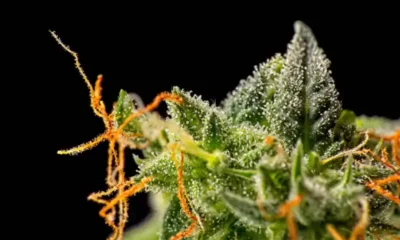Connect with us
Published
10 months agoon

While Vermont only recently opened up its adult-use market for cannabis sales late last year, leaders are revisiting the state’s medical cannabis program with a number of new reforms.
Under new legislation, medical patients will be allowed to “cultivate not more than six mature and 12 immature cannabis plants,” and medical products will now max out at 100 mg of THC per serving. The law also expands medical cannabis access to patients with post-traumatic stress and increases the total number of patients that caregivers are allowed to serve at a given time.
House Bill 270, appropriately titled “An act relating to miscellaneous amendments to the adult-use and medical cannabis programs,” ushers in a collection of new changes to the Green Mountain State’s broader cannabis industry. Gov. Phil Scott (R) allowed it to become law without his signature.
Previously, medical cannabis products in Vermont had to cap out at 50 mg per single serving. The new 100 mg limit does not apply to non-consumable cannabis products (like topicals) or solid concentrates, oils and tinctures. The previous rules also indicated that patients could not cultivate more than two mature plants and seven immature plants.
While the bill contains a lengthy list of changes, Scott indicated the main reason he allowed the bill to pass without his signature was to maintain the state’s Cannabis Control Board (CCB).
Scott sent a letter to the General Assembly outlining his decision, highlighting that the bill repeals the termination of the CCB. While the change may seem minor on the surface, the governor argued that the sunset of the CCB could have “substantive consequences for the principle of separation of powers.”
“I understand there is a need for an alternative structure for regulating controlled substances that remain federally illegal so that we do not compromise federal funding. However, when removing the sunset on the CCB, the statutory authority of the CCB needs to be clarified to ensure constitutionality and accountability to the governor,” Scott said in the letter.
Scott also noted that CCB members can only be removed for cause by other CCB members, nodding to the newly added staff creating a roughly 22-member department to take over medical cannabis regulation and the medical registry.
“As an independent entity, the CCB regulates a multi-million-dollar industry with no oversight,” Scott wrote. “Again, while I have complete confidence in the current CCB, this lack of oversight creates the risk for future mismanagement, conflicts of interest and other harmful impacts.”
Scott doubled down as he closed the letter, restating his confidence in the members of the CCB and the Legislature to continue working with him to pass legislation making the necessary modifications to clarify that the CCB’s statutory authority is constitutional.
It’s perhaps no surprise that Scott is taking this stance, given his previous messaging on cannabis legislation and pushes to continue improving the current systems.
“[Recreational cannabis legalization] has been a top priority for the majority in the Legislature for four years, but their work is not complete,” Scott said in 2020 after Vermont legalized adult-use cannabis. “They must ensure equity in this new policy and prevent their priority from becoming a public health problem for current and future generations.”
Scott also allowed the bill legalizing adult-use cannabis to become law without his signature.
Among the many provisions included in the legislation, the new law also creates a new class of “propagation cultivators” who will be allowed to grow and sell immature plants and clones. It also creates an advisory group to make recommendations for direct funding to communities that have been disproportionately affected by cannabis criminalization and the War on Drugs.
Even though the state’s recreational program is practically brand new, Vermont lawmakers initially legalized medical cannabis nearly two decades ago in 2004. Two years prior to adult-use legalization in 2020, leaders depenalized adult-use cannabis possession.
While Vermont has enjoyed legal cannabis in some capacity for longer than most states, residents are flocking to the state’s newly opened adult-use dispensaries. Back in February, the state saw record-high cannabis sales, $6,477,957, representing about a 6.9% uptick in rate of sales growth from January to February.


Despite City Efforts, Hemp Shops Posing as Dispensaries Prevail in Las Vegas


Cannabis Community, Investors React to DEA Decision To Reschedule


Georgia Governor Signs Bill Establishing Licensing Requirements To Grow Hemp


Study: Psilocybin Enhances Meditation


Ohio GOP Lawmakers Debate Adult-Use MJ Priorities, Eye June for Regulation Approval


Taylor Swift Puts Narcotics Into All of Her Songs on ‘The Tortured Poets Department’
